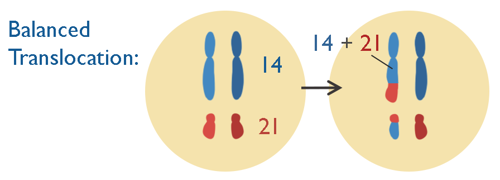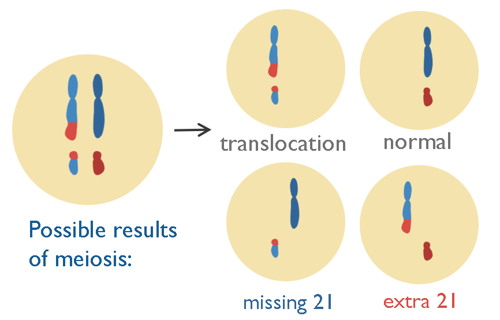
Are fathers with a translocation more likely than mothers to pass down Trisomy 21?
May 25, 2004

- Related Topics:
- Trisomy/Aneuploidy,
- Translocation,
- Chromosomes
Anonymous asks:
"In Down syndrome besides regular trisomy there is a chance of having a translocation of chromosome no. 21 with chromosomes 13, 14, or 15. One of the parents can be a balanced carrier of this translocation. I read that if a father is a carrier then there is an increased chance of having an affected child than if the mother is a carrier of translocation. Why is there a difference?"
Good question. I knew about balanced translocations and Down syndrome but hadn't looked into it in too much detail before. It seems, though, that mothers who carry a balanced translocation have a higher chance of having an affected child than fathers.
People usually have two copies of each chromosome (except for the sex chromosomes, X and Y). About 95% of Down syndrome cases are caused by having three copies of chromosome 21.
About 3-4% of cases are because some or all of chromosome 21 has been translocated, or moved to another chromosome. For Down syndrome cases, it’s most common for chromosome 21 to become stuck to chromosome 14, although 13, 15, 21, and 22 are also possibilities.
A balanced carrier is someone who has the right number of copies of chromosome 21, but one copy is stuck to another chromosome. These people still have 2 copies of chromosome 21 and so don't have any Down syndrome symptoms. However, their children can inherit Down syndrome.

How can this happen? Through normal sperm production, it is possible to make a sperm cell with the chromosome made from chromosomes 14 and 21 and the "free" chromosome 21. When this sperm cell fertilizes a "normal" egg containing a copy of chromosome 21, the resulting child will have 3 copies of chromosome 21.

Theoretically, there should be a 25% chance for a child with a normal number of chromosomes, a 25% chance for a child carrying a balanced translocation, a 25% chance for a child with Down syndrome, and a 25% chance for a missing chromosome. Unfortunately, a missing chromosome will result in a nonviable pregnancy. This leaves us with 3 remaining possibilities, and so a 1 in 3 chance of a child with Down syndrome.
However, instead of this theoretical 1 in 3 chance of having a child with Down syndrome, the actual numbers are much lower. A mother who carries a balanced translocation has a 10-15% chance of having an affected child, while a father with the same translocation has only a 3-5% chance.1-2
The theoretical 33% chance may not be accurate because a high percentage of fetuses with three copies of chromosome 21 are not viable. It may also be because not all of the cells in the parent’s body carry the balanced translocation.
Why the difference between men and women? Researchers don't seem to know, although there is some talk about it being due to the fact that women are born with all of their eggs while men make new sperm from puberty on. Because of this, there seems to be a selection against chromosomal abnormalities in sperm production which means men would produce fewer sperm with the wrong number of chromosomes.

Author: Dr. D. Barry Starr
Barry served as The Tech Geneticist from 2002-2018. He founded Ask-a-Geneticist, answered thousands of questions submitted by people from all around the world, and oversaw and edited all articles published during his tenure. AAG is part of the Stanford at The Tech program, which brings Stanford scientists to The Tech to answer questions for this site, as well as to run science activities with visitors at The Tech Interactive in downtown San Jose.
 Skip Navigation
Skip Navigation
